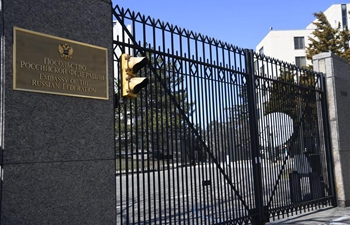WASHINGTON, March 28 (Xinhua) -- Chinese scientists have discovered a new molecular pathway that plays a critical role in the development of chronic pain, paving the way for new therapies for treating pain in cancer patients.
In a study published on Wednesday in the journal Science Signaling, Xin Wenjun, a professor of physiology at Zhongshan Medical School of Sun Yat-Sen University and his colleague identified a protein modification called "palmitoylation" in rat neurons that can promote excessive neuronal signaling.
A protein called delta-catenin which involves in cognitive development and memory formation is known to regulate the modification in the brain, which enhances communication between neurons.
Now Xin's team has suggested that it may contribute to the onset of chronic pain.
They first induced inflammation in rats by exposing them to either a chemotherapeutic drug or nerve injury, and then traced how delta-catenin interacted with other structures in the dorsal root ganglion, a cluster of neurons found in the spinal cord.
"Dorsal root ganglion plays key role in transmitting and regulating pain signaling and we found the palmitoylation significantly activated there, so we focus on the dorsal root ganglion," Xin told Xinhua.
Xin's team observed that palmitoylation of delta-catenin increased in neuronal tissue after inflammation was initiated.
Fluorescent microscopy revealed that palmitoylation mediates the formation of a complex between delta-catenin, KIFs, a family of proteins involved in transporting molecules in cells, and voltage-gated sodium ion channels, which were previously found to be involved in the transmission of chronic pain signals.
Also, injecting rats with compounds that inhibited delta-catenin accumulation or palmitoylation alleviated their pain, hinting that targeting palmitoylation may help reduce chronic pain in people.
"Clinical study shows that 37 percent of cancer patients experience continuous pain that may lead to end of chemotherapy," Xin said. "Elaborating a common molecular pathway behind those chronic pains can help patients complete the cycles of chemotherapy."












